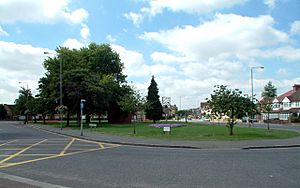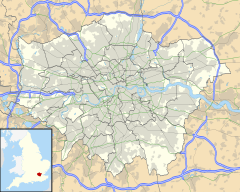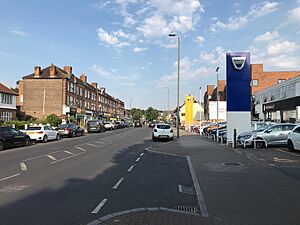Elmers End facts for kids
Quick facts for kids Elmers End |
|
|---|---|
 Elmers End Green |
|
| OS grid reference | TQ355685 |
| London borough | |
| Ceremonial county | Greater London |
| Region | |
| Country | England |
| Sovereign state | United Kingdom |
| Post town | BECKENHAM |
| Postcode district | BR3 |
| Dialling code | 020 |
| Police | Metropolitan |
| Fire | London |
| Ambulance | London |
| EU Parliament | London |
| UK Parliament |
|
| London Assembly |
|
Elmers End is a part of south-east London, England. It is located in the London Borough of Bromley. Long ago, it was part of the historic county of Kent. You can find Elmers End south of Beckenham, west of Eden Park, north of Monks Orchard, and east of Anerley.
Contents
Elmers End: A Look at Its Past
How Elmers End Got Its Name
The name Elmers End likely comes from the Aylmer family. They were important landowners in the 1200s. The name probably meant the "end" of their land towards the south. Another idea is that Ralph Aylmer owned the land when King Henry III was in charge (1216-1272). At that time, it was called a 'district'.
The name Beckenham appeared about 50 years later. However, the Bromley Council website says Beckenham has been around since AD 862 and Elmers End since AD 1226.
Growth and Changes Over Time
Elmers End station opened in 1864. Back then, this area was mostly countryside. From the 1860s, a sewage farm started operating here. Slowly, houses began to be built around the large green space, which is now a roundabout.
More buildings appeared quickly in the early 1900s. A big industrial area was built south of the railway tracks. This area is now closed. It used to have factories like Muirhead and Twinlock. You can even see it from old aerial photos. These companies moved out, and the site was empty until 1995. That's when Tesco built a new superstore there. Another old paint factory site nearby has also been turned into a new industrial area.
An Odeon cinema used to stand on Elmers End Green from 1939 to 1959. In the 1960s, the old sewage farm closed down. Because it might have had harmful metals, it was not safe for building houses. Instead, it became a nature park called South Norwood Country Park. This park is now part of the London Borough of Croydon.
Beckenham Crematorium and Cemetery
The main Beckenham crematorium is located between South Norwood Country Park and Birkbeck station. It is also known as Elmers End Cemetery. Many famous people are buried here. These include W.G. Grace (a famous cricketer), Frank Bourne, Thomas Crapper, Jerzy Wołkowicki, William Stanley, and George Evans (VC). George Evans won a Victoria Cross medal in 1916 for his bravery.
Upper Elmers End: A Separate Place No More
Upper Elmers End was once a small village, separate from Elmers End. It was centered around a sharp bend on Upper Elmers End Road, south of the railway line. This village had a brewery, which became Kempton's bakery in the 1930s. Around this time, many new houses were built. Over time, Upper Elmers End joined with Elmers End and Eden Park, losing its own separate identity.
Getting Around Elmers End
Train and Tram Services
Elmers End railway station connects the area to other parts of London. You can catch Southeastern trains to London Charing Cross and London Cannon Street. These trains go through Catford Bridge. You can also take trains to Hayes.
Elmers End also has Tramlink services. These trams can take you to Wimbledon, passing through East Croydon.
Bus Connections
Several bus routes serve Elmers End. These buses are run by Transport for London. They connect Elmers End to many nearby areas. These include Beckenham, Bromley, Catford, Croydon, Crystal Palace, Lewisham, Orpington, Penge, Purley, and Woolwich.
Well-Known People from Elmers End
- Walter de la Mare - He was a poet and author. There is a special plaque at 195 Mackenzie Road in his memory.
- John Fry - He was a well-known doctor, researcher, and writer. A plaque at St James's Practice remembers him.
Gallery
 | John T. Biggers |
 | Thomas Blackshear |
 | Mark Bradford |
 | Beverly Buchanan |










